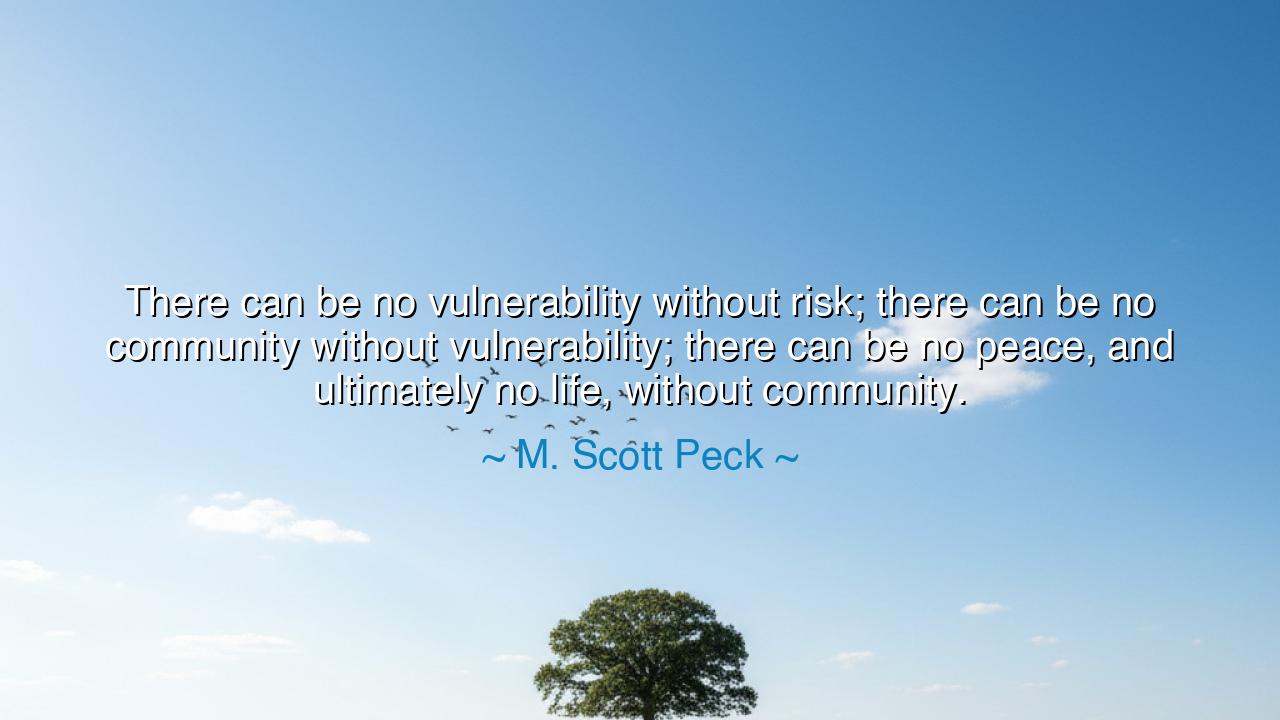
There can be no vulnerability without risk; there can be no
There can be no vulnerability without risk; there can be no community without vulnerability; there can be no peace, and ultimately no life, without community.






The words of M. Scott Peck—“There can be no vulnerability without risk; there can be no community without vulnerability; there can be no peace, and ultimately no life, without community.”—resound like an ancient law carved not in stone, but in the hearts of men. They remind us that the path to life’s deepest treasures is never without danger, that to live fully is to dare to open one’s soul, and that the greatest strength of humanity lies not in the fortress of the self, but in the bonds of community. In these lines, Peck gives us a chain of truths, each link bound to the other: risk, vulnerability, community, peace, and life. Remove one, and the whole chain falls apart.
The origin of this teaching comes from Peck’s lifelong work as a psychiatrist and writer, where he explored the spiritual and psychological needs of mankind. He saw that people long for belonging and peace, yet fear the very openness required to achieve them. For to be vulnerable is to expose one’s wounds, one’s fears, one’s hopes. It is to risk rejection or betrayal. But without this daring openness, there can be no real connection, and without connection, there can be no true community. His words echo the wisdom of sages: life is not found in isolation but in shared struggle and shared love.
History confirms this truth again and again. Consider the founding of the early Christian church, where men and women, persecuted and hunted, chose to live vulnerably with one another. They shared their possessions, broke bread in secret, and carried each other’s burdens. Their vulnerability brought immense risk—exposure could mean death—but through it, they created a community so powerful that it endured centuries of trial. From their vulnerability arose unity, from unity arose peace, and from that peace arose a movement that changed the world.
We see the opposite truth in societies where vulnerability was rejected. The mighty walls of Sparta, built on the suppression of weakness and the denial of compassion, created a people hardened like iron. Yet iron, though strong, eventually rusts and breaks. Without openness, without mercy, their community was brittle, and when the storms of history came, Sparta fell. Peck’s words remind us that strength without vulnerability is but an illusion, for true life cannot grow where hearts are closed.
At the heart of this teaching lies the paradox of humanity: to be strong, one must first be weak. To find safety, one must risk danger. To know love, one must risk heartbreak. To live in peace, one must dare to trust others. Vulnerability is not a weakness, but the seed of every noble bond. It is the risk that opens the door to communion, and communion is the soil where peace is born. Without it, the human spirit withers in the desert of isolation.
The lesson for us is this: do not fear to be vulnerable. In your families, in your friendships, in your communities, risk opening your heart. Share not only your triumphs, but your struggles. Ask for help. Offer forgiveness. Extend kindness even when it may not be returned. In doing so, you weave the threads of community, and from that weaving arises the strength of peace and the fullness of life.
Practically, this means cultivating spaces where openness is welcomed. It means listening deeply without judgment, admitting when you are wrong, and giving others the courage to do the same. It means resisting the temptation to build walls of pride and instead choosing bridges of honesty. For only in such spaces can humanity flourish, bound together not by fear, but by trust.
Thus, Peck’s words endure like a torch in the darkness: risk leads to vulnerability, vulnerability creates community, community births peace, and peace sustains life. Let us then not shrink from the risk of opening our hearts, for in doing so we discover not only each other, but the very essence of what it means to live.






AAdministratorAdministrator
Welcome, honored guests. Please leave a comment, we will respond soon